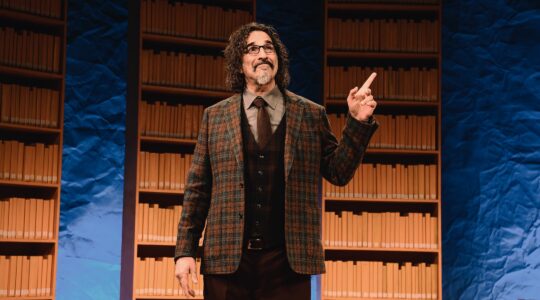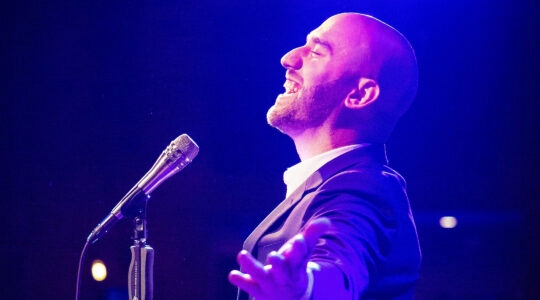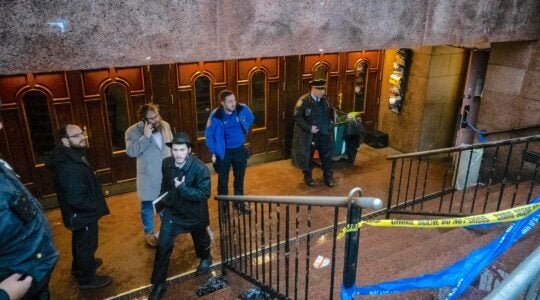If you thought Rabbi Joseph Lookstein was a revolutionary in the creation of the 20th century day school, his eponymous Web site aims to change the Jewish 21st century school as much as the talkies changed the movies.
Bar Ilan Universityís Lookstein Center for Jewish Education in the Diaspora (www.lookstein.biu.ac.il), named for its late chancellor who also founded New Yorkís Ramaz School, has taken upon itself to become an Internet-based international clearing house of new educational ideas, facilitating interaction among principals, teachers and parents.
Much as the Internet defies geopolitical boundaries, the Lookstein computers in Ramat Gan are defying institutional and denominational boundaries, as well. Across the continents, there has already developed a flow of curriculum, criticism and uninhibited conversation, eliminating distances that are sometimes more mental than measured in miles.Only a few months old, a virtual community of more than 600 educators have begun participating in whatís called the Lookjed list, an open forum for questions and answers on anything to do with Jewish education. Where once educational conventions or resource groups were limited to those whose schools were willing to finance travel, now any teacher is on his or her own.
Queries have come in from a private Gemara tutor in Seattle, and answers have come from educators as prominent as Dr. Moshe Sokolow, director of the Association of Modern Orthodox Day Schools and Yeshiva High Schools. An Israeli teacher asks, ìDoes anyone on the list have ideas on which Masechet (Mishna) should be taught at each grade level from first through sixth?î How do you teach davening? Does translating the Torah from biblical Hebrew to modern Hebrew mean a ìdumbing downî of sophisticated concepts? A Pittsburgh teacher wants to know what ìappropriateî course of English literature do other yeshivas suggest? An Israeli Reform school offers curriculum and programming to commemorate the assassination of Yitzchak Rabin.
Teachers have logged in from St. Petersburg, Russia, to Cape Town, South Africa. Ideas volley between relatively isolated teachers in Ohio, Atlanta, Pittsburgh, Toronto, and Jay Goldmintz, headmaster of the Ramaz Upper School, and Joel Wolowelsky of the Yeshivah of Flatbush.
Interested in teaching about non-Jews? Ramaz tells of their senior elective in African-American history, and the Beth Tfiloh School in Baltimore has a collaborative course in black and Jewish histories involving non-Jewish students from a nearby public school.
A psychologist wants help with his research on the conflict that a year of yeshiva study in an Israel sometimes brings to students and their parents.Rabbi Mordechai Spiegelman, former director of New Yorkís Board of Education, says, ìEach time I read it, I feel as if Iím attending a convention of seasoned, professional educators.
Bar Ilan University, whose chancellor, Rabbi Emanuel Rackman, like Rabbi Lookstein, came to Bar Ilan after a long career in the New York rabbinate, has long been active in fostering Jewish education outside Israel. Aside from activity in the former Soviet Union, Bar Ilan has run an international student competition on Jewish identity to promote Israeli levels of literacy in the diaspora.
It was only in the past few years that the Lookstein Center took on its present mission, with the arrival of its director, Rabbi Stuart Zweiter, from New York, where heíd been principal of HAFTR, the Hebrew Academy of the Five Towns and Rockaway, while sending his children to SAR in Riverdale, which he sees as a model for Jewish schools. ìIt was a celebration of education. In elementary schools, one of the most important things you can accomplish is that kids enjoy going to a Jewish school. The only thing I regret about making aliyah is that my youngest child didnít graduate from there.
Zweiter, 49, says the Lookstein Center is trying to bring more Jews into the business of Jewish education, where he says thereís still a severe shortage. Despite the myth of poverty, Zweiter says, ìItís not an issue anymore of money. Itís not that exceptional for principals of certain day schools to command salaries of more than $200,000.î As for faculty, ìI presume weíre now not that far from the top teacher making close to $100,000. The word isnít out there yet that the money is so good.
Despite the fact that heís Modern Orthodox and many successful day schools are under Modern Orthodox auspices, he says, ìI donít think the Modern Orthodox community in the United States is alive and well. Itís not. Nekuda. Period. It needs more courageous leadership and to present a serious alternative model. One of the first things that attracted me to Bar Ilan is that it is an open academic environment.
Thereís a vacuum in the United States,î says Zweiter, ìbut I donít think we can fill it alone. We have to be very careful. We donít want to come on a white horse and say we know whatís best for you. You are us. What weíre doing for North America, weíre doing with former North Americans,î such as Rabbi Yona Fuld, a former principal at SAR and Sholom Berger, a former teacher at top New York area yeshivas, who oversees the Lookjed list.Berger says he envisions an Internet community where educators ìwould be supportive of one another, not only by answering queries on-list, but by sharing successes, failures and frustrations with peers off-list, as well.îZweiter says, ìThe sheer mass of Jewish education going on in Israel makes it an extraordinary resource. There is a core Jewish curriculum because there is an Israeli Ministry of Education. The ministry and Bar Ilan developed the Torah Shel Baíal Peh Project, producing educational materials for the elementary school study of Talmud by topical units. One of the first things we did on our Web site is translate the catalogue of their materials. With the Internet, the textbook of tomorrow will not be limited to textbooks.îThe Lookstein Center is shaping up as a Radio Free Europe for teachers, getting information into and out of places that were isolated. ìI like being adventurous,î says Zweiter. ìWeíre outside the pale,î geographically and institutionally, ìand that gives us a certain freedom to move
The New York Jewish Week brings you the stories behind the headlines, keeping you connected to Jewish life in New York. Help sustain the reporting you trust by donating today.




